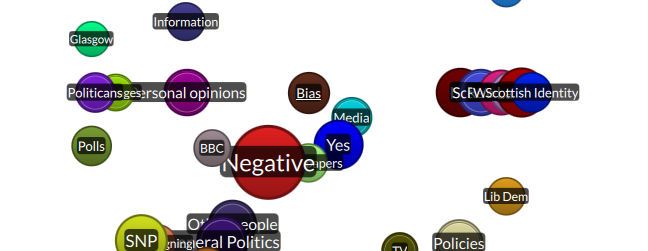Qualitative research on the Scottish Referendum using Quirkos
We've now put up the summary report for our qualitative research project on the Scottish Referendum, which we analysed using Quirkos. You can download the PDF of the 10 page report from the link above, I hope you find something interesting in there

We've now put up the summary report for our qualitative research project on the Scottish Referendum, which we analysed using Quirkos. You can download the PDF of the 10 page report from the link above, I hope you find something interesting in there! The full title is "Overview of a qualitative study on the impact of the 2014 referendum for Scottish independence in Edinburgh, and views of the political process" and here's the summary findings:
"The interviews revealed a great depth of understanding of a wide range of political issues, and a nuanced understanding of many arguments for and against independence. Many people described some uncertainty about which way to vote, but it did not seem that anyone had changed their mind over the course of the campaigning.
There was a general negative opinion towards the general political system, especially Westminster, from both yes and no voters. Participants had varying opinions on political leaders and parties, even though some people were active members of political parties. Yes and No supporters both felt that the No campaign was poorly run, and used too many negative messages, this feeling was especially strong in No voters.
The most important concerns for responders was about public finances, financial stability of an independent Scotland, the issue of currency for Scotland was often mentioned, but often with distrust of politicians comments on the subject. Westminster induced austerity and the future of the NHS also featured as important policy considerations.
People expressed generally negative views of the media portrayal of the referendum, most feeling that newspapers and especially the BBC had been biased, although No supporters were more likely to find the media balanced.
In general, people felt that the process had been good for Scotland, even No supporters, and there was general support for greater devolution of powers. People had seen the process as being very positive for the SNP, and nearly all respondents felt the Yes campaign had been well run. People expressed a negative view of the Labour party during the campaign, although voters also mentioned strong criticism of Labour’s wider policy position in recent years. People had generally positive opinions of Nicola Sturgeon, mixed reactions to Alex Salmond, and generally negative comments on Ed Miliband’s public image, while also stating that this should not be an important factor for voters. People believed that the polls would be correct in predicting a swing from Labour to the SNP in Scotland.
Many expressed a belief that the level of debate in Edinburgh had been good, and that the Yes campaign was very visible. Respondents were positive about the inclusion of voters from the age of 16, were surprised at how much support the Yes campaign generated, and some felt that a future referendum would be successful in gaining independence for Scotland."
The report also contains some information about the coding process using Quirkos:
"The interviews together lasted 6.5 hours and once transcribed comprised just under 58000 words, an average of 4800 words per interview. 75 themes were used to code the project, with 3160 coding events logged, although each text may cover multiple coding events. In total, 87% of the text was coded with at least one topic. The coding took an experienced coder approximately 7 hours (over a three day period) once any breaks longer than 5 minutes were removed, an average of one code every 8 seconds."
Personally, I've been really happy doing this project with Quirkos, and especially with how quick it took to do the coding. Obviously, with any qualitative analysis process there is a lot of reading, thinking and mind-changing that happens from setting the research questions to writing up a report. However, I really do think that Quirkos makes the coding and exploration process quicker, and I do love how much one can play with the data, just looking to see how much keywords come up, or whether there are connections between certain themes.
In this project, the cluster views (one for media bias shown above) were really revealing, and sometimes surprising. But the side-by-side queries were also really useful for looking to see differences in opinions between Yes and No supporters, and also to demonstrate there was little difference in the quotes from men and women – they seemed to largely care about the same issues, and used similar language.
Feel free to see for yourself though, all the transcripts, as well as the coded project file can be downloaded from our workshop materials pages, so do let me know if Quirkos lets you have a different view on the data!
